PEP六年级上册单词句型和语法复习
pep人教版六年级英语上册重点单词句型语法复习资料

pep人教版六年级英语上册重点单词句型语法复习资料小学六年级上册英语期期末复资料Unit 1How can I get there?我怎样到达那里。
重点单词XXX, post office邮局, bookstore书店,XXX,XXX, crossing十字路口, turn left左转, turn right右转, go straight直走, map地图, compass指南针,GPS全球定位系统,stars星星,XXX意大利餐厅,get to到达。
重点句型1. ---Where is the restaurant?餐厅在哪里?----It’s next to the park on Dong fang Street.它在东方路,在公园附近。
2.---How can we get there?我们如何去那里?----Turn left at the bookstore. Then turn right at the XXX.书店左转,然后病院右转。
3. He now has GPS.他目前有GPS。
4.What an interesting film!多么有趣的电影!方位词复:XXX紧挨着,near在...邻近,XXX在...背面,XXX在...中间,in front of在...前面。
Unit 2Ways to go to school.上学的方式。
重点单词on foot走路, by bike骑车, by bus乘公交, by train乘火车,XXX乘地铁,XXX乘船,by XXX乘飞机,slow down慢下来,XXX交通灯,traffic rules交通规则,go/come to school上学,XXX坐雪橇,XXX坐轮渡,XXX注意,traffic lights交通灯,Stopandwait at a red light红灯停等一等,XXX light黄灯减速并停下,Go at a green light绿灯行。
PEP小学六年级英语上册复习要点--词汇、句型和语法知识

PEP小学六年级英语上册复习要点词汇、句型和语法知识Unit1、How can I get there ?二、习惯语搭配:post office邮局science museum科学博物馆pet hospital宠物医院Italian restaurant意大利餐馆Beihai Park北海公园Palace Museum故宫博物院go straight直走turn right/left右/左转next to挨着in front of...在...前面near the park在公园附近on Dongfang Street在东方大街上三、惯用表达式:Excuse me 打扰一下Follow me, please!请跟着我!四、公式化句型:1、问路的句型及其答语:问句:Where is the + 地点?···在哪儿?答语:It’s + 表示地点的词语。
它···。
2、询问怎么到某地的句型及其答语:问句:How can +主语+ get (to)+地点?···怎么到···?同义句型:Can you tell me the way to +地点?Where is + 地点?Which is the way to +地点?答语:Turn +方向+表示地点的介词短语。
···转。
五、例句:Where is the cinema, please? 请问电影院在哪里?It’s next to the hospital. 它与医院相邻。
Turn left at the cinema, then go straight. It’s on the left.在电影院向左转,然后直行。
它在左边。
Turn left at the bank。
在银行左转。
六、主题写作:范文How to Get to the Science MuseumWe are going to the science museum tomorrow.The science museum is next to the hospital.It’s not far from our school.So we can go there on foot.First,go straight from our school.Next,turn left at the post office and walk for about five minutes.Then turn right at the bookstore.We can find the hospital on the right.Walk straight,and we’ll see the science museum.Unit 2 Ways to go to school二、习惯语搭配:by bike/bus/plane/subway/train/ship/taxi/ferry骑自行车/乘公共汽车/飞机/地铁/火车/船/出租汽车/渡轮take the No.57 bus乘57路公共汽车on foot步行slow down慢下来pay attention to注意traffic lights 交通信号灯look right向右看cross the road横穿马路get off下车at home在家traffic rules 交通规则 get to到达get on 上车be far from…表示离某地远三、惯用表达式:Wait!等一等!Hooray太好了!I see. 我明白了。
PEP人教版英语六年级上册 各单元重点词汇句型归纳整理
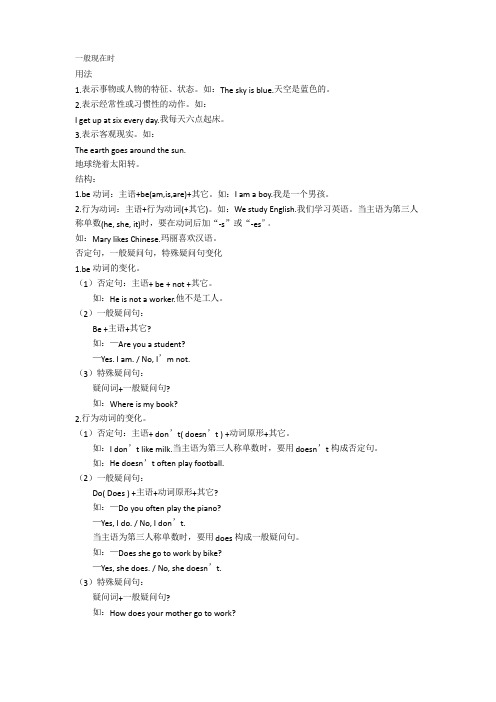
一般现在时用法1.表示事物或人物的特征、状态。
如:The sky is blue.天空是蓝色的。
2.表示经常性或习惯性的动作。
如:I get up at six every day.我每天六点起床。
3.表示客观现实。
如:The earth goes around the sun.地球绕着太阳转。
结构:1.be动词:主语+be(am,is,are)+其它。
如:I am a boy.我是一个男孩。
2.行为动词:主语+行为动词(+其它)。
如:We study English.我们学习英语。
当主语为第三人称单数(he,she,it)时,要在动词后加“-s”或“-es”。
如:Mary likes Chinese.玛丽喜欢汉语。
否定句,一般疑问句,特殊疑问句变化1.be动词的变化。
(1)否定句:主语+be+not+其它。
如:He is not a worker.他不是工人。
(2)一般疑问句:Be+主语+其它?如:—Are you a student?—Yes.I am./No,I’m not.(3)特殊疑问句:疑问词+一般疑问句?如:Where is my book?2.行为动词的变化。
(1)否定句:主语+don’t(doesn’t)+动词原形+其它。
如:I don’t like milk.当主语为第三人称单数时,要用doesn’t构成否定句。
如:He doesn’t often play football.(2)一般疑问句:Do(Does)+主语+动词原形+其它?如:—Do you often play the piano?—Yes,I do./No,I don’t.当主语为第三人称单数时,要用does构成一般疑问句。
如:—Does she go to work by bike?—Yes,she does./No,she doesn’t.(3)特殊疑问句:疑问词+一般疑问句?如:How does your mother go to work?一般过去时一、一般过去时的概念一般过去时表示过去某个时间发生的动作或状态。
新人教版PEP小学英语六年级上册各单元知识点总结
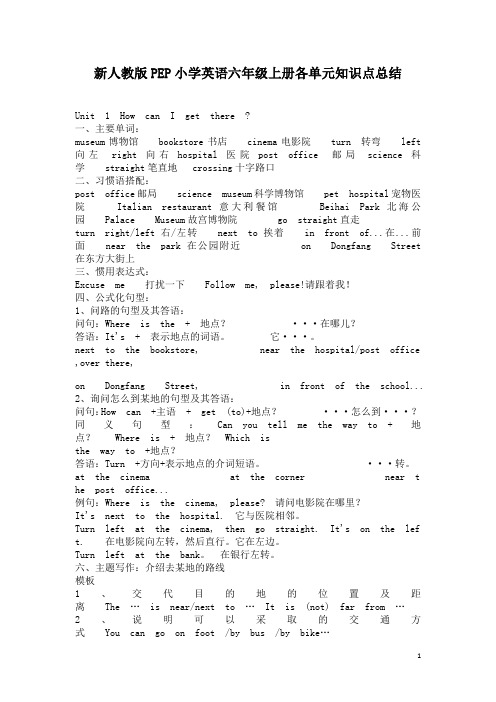
新人教版PEP小学英语六年级上册各单元知识点总结Unit 1 How can I get there ?一、主要单词:museum博物馆bookstore书店cinema电影院turn 转弯left 向左right向右hospital医院post office 邮局science科学straight笔直地 crossing十字路口二、习惯语搭配:post office邮局science museum科学博物馆pet hospital宠物医院Italian restaurant意大利餐馆Beihai Park北海公园Palace Museum故宫博物院go straight直走turn right/left右/左转next to挨着in front of...在...前面near the park在公园附近on Dongfang Street 在东方大街上三、惯用表达式:Excuse me 打扰一下Follow me, please!请跟着我!四、公式化句型:1、问路的句型及其答语:问句:Where is the + 地点?···在哪儿?答语:It's + 表示地点的词语。
它···。
next to the bookstore, near the hospital/post office ,over there,on Dongfang Street, in front of the school...2、询问怎么到某地的句型及其答语:问句:How can +主语+ get (to)+地点?···怎么到···?同义句型:Can you tell me the way to +地点?Where is + 地点?Which isthe way to +地点?答语:Turn +方向+表示地点的介词短语。
PEP六年级上册单词、句型和语法复习

PEP六年级上册复习一(词汇)四会单词(听说读写)Unit 1:by (经……,乘……) foot(脚) bike(自行车) bus(公共汽车) train(火车) how(怎样) go to school(上学)traffic(交通) traffic light(交通灯) traffic rule(交通规则)stop(停;停车站)wait (等;等待)get to(到达)by plane(乘飞机) by ship(乘轮船) by subway(乘地铁)Unit 2:library(图书馆) post office(邮局) hospital(医院) cinema(电影院) bookstore(书店)turn(转弯) then(然后) where(在哪里,到哪里) please(请) next to(与……相邻) turn right (向右转) turn left(向左转) go straight(笔直走) north(北) south(南) east(东) west(西)Unit 3:next week(下周) this morning(今天上午) this afternoon(今天下午) this evening (今天晚上) comic book(漫画书) post card(明信片) newspaper(报纸) buy(购买)Unit 4:hobby(爱好) ride a bike—riding a bike(骑自行车) play the violin—playing the violin(拉小提琴) dive —diving(跳水) make kites—making kites(制作风筝) collect stamps—collecting stamps(集邮) live—lives(居住) teach—teaches(教) go—goes(去) watch—watches(看) read—reads(读,看) does(助动词,无义) doesn’t=does notUnit 5:singer(歌唱家,歌手) writer(作家) actor(男演员) actress(女演员) artist(画家)TV reporter(电视台记者) engineer(工程师) accountant(会计) salesperson(销售员)policeman(男警察) cleaner(清洁工) where(在哪里;到哪里) work(工作)Unit 6:rain(雨;下雨) cloud (云;云彩) sun(太阳) stream((小)河;(小)溪) come from(来自……;从……来) seed(种子) soil(土壤) sprout (苗;芽;嫩芽) plant(植物;种植) should (应该) then(然后)三会单词(听说读)a pair of(一双)always(总是;一直)dictionary(词典;字典)magazine(杂志)tomorrow(明天)excuse me (对不起)fun (快乐;乐趣)go to the cinema(去看电影)look(看上去)month(月份;月)read a magazine(阅读杂志)science museum (科学博物馆)shoe store(鞋店)show(展览;演出;表演;节目)take(乘坐)take a trip(去旅行)tell(告诉)tonight(今晚)vapour(蒸汽;水汽)want(想要)with (同……;和……)know(知道)minute (分钟)again(再一次;又;再)PEP六年级上册复习二(句型)四会句型(听说读写)Unit 1How do you go to school, Sarah? Sarah 你怎么去学校?Usually I go to school on foot. 通常我步行去。
新版PEP六年级上册语法知识复习要点
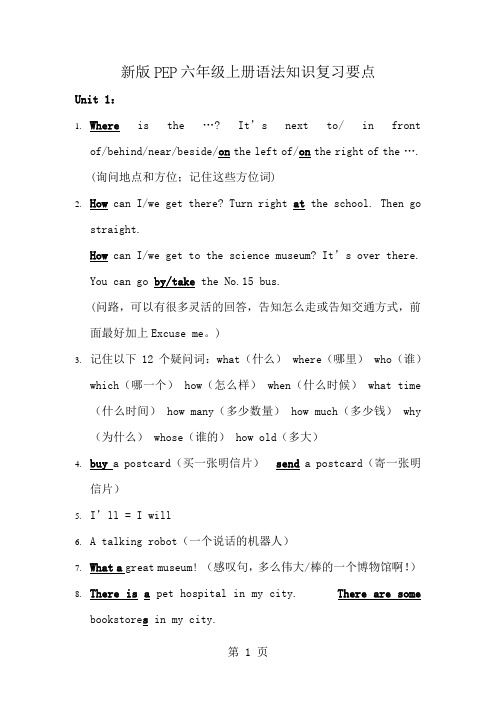
新版PEP六年级上册语法知识复习要点Unit 1:1.Where is the …? It’s next to/ in frontof/behind/near/beside/on the left of/on the right of the ….(询问地点和方位;记住这些方位词)2.How can I/we get there? Turn right at the school. Then gostraight.How can I/we get to the science museum? It’s over there.You can go by/take the No.15 bus.(问路,可以有很多灵活的回答,告知怎么走或告知交通方式,前面最好加上Excuse me。
)3.记住以下12个疑问词:what(什么) where(哪里) who(谁)which(哪一个) how(怎么样) when(什么时候) what time (什么时间) how many(多少数量) how much(多少钱) why (为什么) whose(谁的) how old(多大)4.buy a postcard(买一张明信片)send a postcard(寄一张明信片)5.I’ll = I will6. A talking robot(一个说话的机器人)7.What a great museum! (感叹句,多么伟大/棒的一个博物馆啊!)8.There is a pet hospital in my city. There are somebookstore s in my city.Is there a pet hospital in your city?Are there any bookstore s in my city?(there be句型的单复数、肯定句和一般疑问句形式回忆起来)9.What an interesting film! (感叹句,多么有趣的一部电影啊!)10.Italian restaurant (意大利餐厅)11.yum=yummy12.On Dongfang Street (注意介词)13.work 有多种意思,比如工作;奏效,起作用,需根据上下文来理解。
(完整word版)pep六年级上册英语-各单元知识点总结
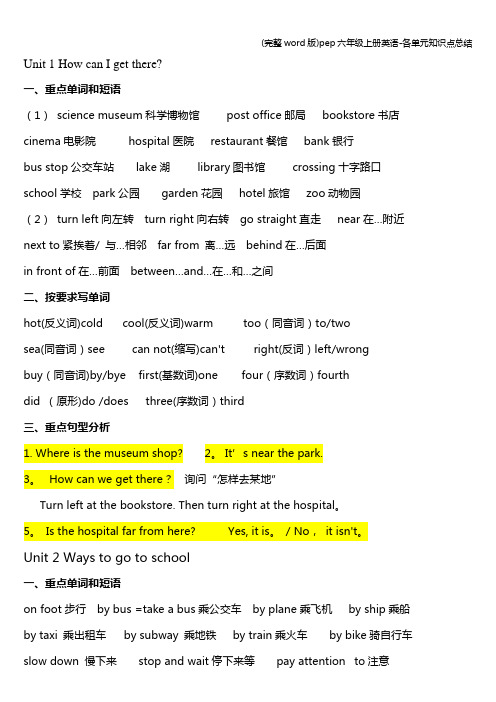
Unit 1 How can I get there?一、重点单词和短语(1)science museum科学博物馆post office邮局bookstore书店cinema电影院hospital医院restaurant餐馆bank银行bus stop公交车站lake湖library图书馆crossing十字路口school学校park公园garden花园hotel旅馆zoo动物园(2)turn left向左转turn right向右转go straight直走near在…附近next to紧挨着/ 与…相邻far from 离…远behind在…后面in front of在…前面between…and…在…和…之间二、按要求写单词hot(反义词)cold cool(反义词)warm too(同音词)to/twosea(同音词)see can not(缩写)can't right(反词)left/wrongbuy(同音词)by/bye first(基数词)one four(序数词)fourthdid (原形)do /does three(序数词)third三、重点句型分析1. Where is the museum shop? 2。
It’s near the park.3。
How can we get there?询问“怎样去某地”Turn left at the bookstore. Then turn right at the hospital。
5。
Is the hospital far from here? Yes, it is。
/ No,it isn't。
Unit 2 Ways to go to school一、重点单词和短语on foot步行by bus =take a bus乘公交车by plane乘飞机by ship乘船by taxi 乘出租车by subway 乘地铁by train乘火车by bike骑自行车slow down 慢下来stop and wait停下来等pay attention to注意cross the road横穿马路traffic light通信号灯at home在家look right向右看look at朝…看play with和…一起玩二、按要求写单词go (反义词)come foot(复数)feet child(复数)childrenearly(反义词)late good(反义词)bad take(反义词)bringslow(反义词)quick/fast go(过去式)went do(过去式)diddo(第三人称单数) does go(第三人称单数)goessame 相同的(反义词)different不同的miss(过去式)missedwrong 错误(反义词)right正确can(否定形式)can’t三、重点句型分析1。
人教版六年级pep三年级起点英语单词及重点句子

Unit 1 How do you go to school?一、重点短语:by plane 坐飞机 by ship 坐轮船 on foot步行 by bike 骑自行车by bus 坐公共汽车 by train 坐火车 trafficlights 交通灯 traffic rules交通规则go to school 去上学 get to 到达 get on上车 get off下车Stop at a red light. 红灯停 Wait at a yellow light. 黄灯等Go at a green light. 绿灯行二、重点句型:1.How do you go to school?你怎么去上学?ually I go to school on foot.Sometimes I go by bus.通常我步行去上学。
有时候骑自行车去。
3.How can I get to Zhongshan Park ?我怎么到达中山公园?4.You can go by the No. 15 bus. 你可以坐15路公共汽车去。
三、重点语法:1、There are many ways to go somewhere.到一个地方去有许多方法。
这里的ways一定要用复数。
因为there are是There be句型的复数形式。
2、on foot 步行。
乘坐其他交通工具大都可以用介词by…,但是步行只能用介词on 。
3、go to school的前面绝对不能加the,这里是固定搭配。
4、USA 和US 都是美国的意思。
另外America也是美国的意思。
5、go to the park 前面一定要加the. 如果要去的地方有具体的名字,就不能再加the ,如果要去的地方没有具体名字,都要在前面加the. (go to school除外。
)6、How do you go to…?你怎样到达某个地方?如果要问的是第三人称单数,则要用:How does he/she…go to …?7、反义词:get on(上车)—get off(下车) near(近的)—far(远的) fast(快的)—slow(慢的)because(因为)—why(为什么) same(相同的)—different(不同的)8、近义词:see you—goodby esure—certainly—of course9、频度副词:always 总是,一直 usually 通常 often经常 sometimes 有时候 never 从来不Unit 2 Where is the science museum?一、重点短语:library 图书馆 post office 邮局 hospital医院 cinema 电影院bookstore书店 science museum科学博物馆 turnleft向左转turn right 向右转 go straight 直行 north北 south南east东west西next to靠近、与……。
PEP初中英语六年级上册知识点归纳
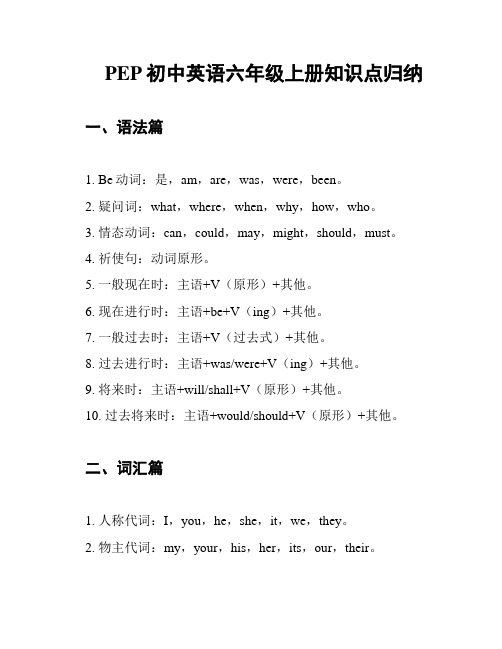
PEP初中英语六年级上册知识点归纳一、语法篇1. Be动词:是,am,are,was,were,been。
2. 疑问词:what,where,when,why,how,who。
3. 情态动词:can,could,may,might,should,must。
4. 祈使句:动词原形。
5. 一般现在时:主语+V(原形)+其他。
6. 现在进行时:主语+be+V(ing)+其他。
7. 一般过去时:主语+V(过去式)+其他。
8. 过去进行时:主语+was/were+V(ing)+其他。
9. 将来时:主语+will/shall+V(原形)+其他。
10. 过去将来时:主语+would/should+V(原形)+其他。
二、词汇篇1. 人称代词:I,you,he,she,it,we,they。
2. 物主代词:my,your,his,her,its,our,their。
3. 形容词:big,small,long,short,tall,fat,thin,heavy,light,old,young。
4. 副词:often,seldom,always,never,sometimes,very,too,so,quite。
5. 数词:序数词(first,second,third)和基数词(one,two,three)。
6. 时间词:week,month,year,morning,afternoon,evening,night。
7. 颜色词:red,green,blue,yellow,white,black。
8. 动词:play,listen,watch,read,write,swim,dance,sing,draw,speak。
9. 名词:book,desk,chair,table,bed,door,window,picture,pen,ruler,bottle,bag,pencil case。
三、对话篇3. Talking about family: How many people are there in your family? What do your parents do?4. Talking about hobbies: Do you like…? What’s your favourite…?5. Talking about school: What subjects do you study at school? Who’s your favourite teacher?6. Talking about daily routines: What time do you get up/go to bed? What do you do on weekends?希望以上知识点归纳对您有所帮助。
六年级英语-上册复习资料
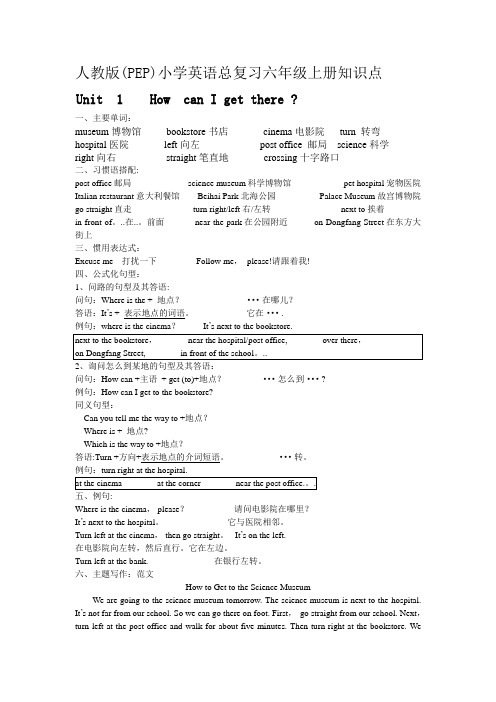
人教版(PEP)小学英语总复习六年级上册知识点Unit 1 How can I get there ?一、主要单词:museum博物馆bookstore书店cinema电影院turn 转弯hospital医院left向左post office 邮局science科学right向右straight笔直地crossing十字路口二、习惯语搭配:post office邮局science museum科学博物馆pet hospital宠物医院Italian restaurant意大利餐馆Beihai Park北海公园Palace Museum故宫博物院go straight直走turn right/left右/左转next to挨着in front of。
..在..。
前面near the park在公园附近on Dongfang Street在东方大街上三、惯用表达式:Excuse me 打扰一下Follow me,please!请跟着我!四、公式化句型:1、问路的句型及其答语:问句:Where is the + 地点?···在哪儿?答语:It’s + 表示地点的词语。
它在···.例句:where is the cinema?It’s next to the bookstore.2、询问怎么到某地的句型及其答语:问句:How can +主语+ get (to)+地点?···怎么到···?例句:How can I get to the bookstore?同义句型:Can you tell me the way to +地点?Where is + 地点?Which is the way to +地点?答语:Turn +方向+表示地点的介词短语。
···转。
例句:turn right at the hospital.五、例句:Where is the cinema, please?请问电影院在哪里?It’s next to the hospital。
六年级英语上册知识点复习汇总
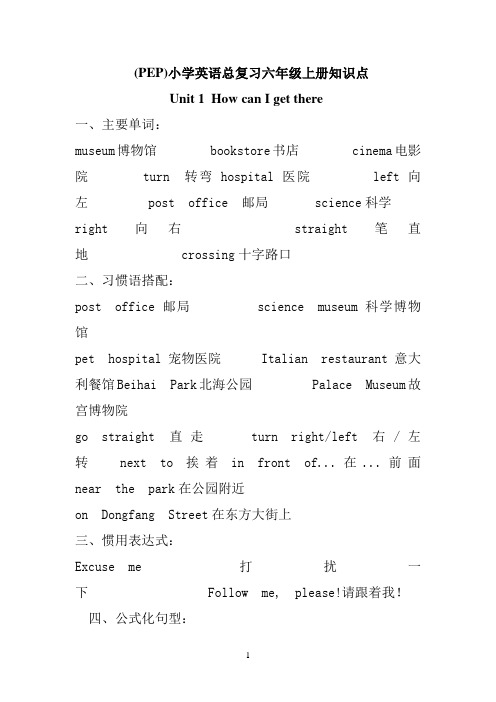
(PEP)小学英语总复习六年级上册知识点Unit 1 How can I get there一、主要单词:museum博物馆bookstore书店cinema电影院turn 转弯hospital医院left向左post office 邮局science科学right向右straight笔直地crossing十字路口二、习惯语搭配:post office邮局science museum科学博物馆pet hospital宠物医院Italian restaurant意大利餐馆Beihai Park北海公园 Palace Museum故宫博物院go straight直走turn right/left右/左转next to挨着in front of...在...前面near the park在公园附近on Dongfang Street在东方大街上三、惯用表达式:Excuse me 打扰一下Follow me, please!请跟着我!四、公式化句型:1、问路的句型及其答语:问句:Where is the + 地点······在哪儿答语:It's + 表示地点的词语(next to the bookstore,near the hospital/post office, over there,on Dongfang Street, infront of the school... )2、询问怎么到某地的句型及其答语:问句:How can +主语+ get (to)+地点·····怎么到·····同义句型:Can you tell me the way to +地点Where is + 地点Which is the way to +地点五、例句:Where is the cinema, please 请问电影院在哪里It's next to the hospital.它与医院相邻。
新PEP小学英语六年级上册复习资料
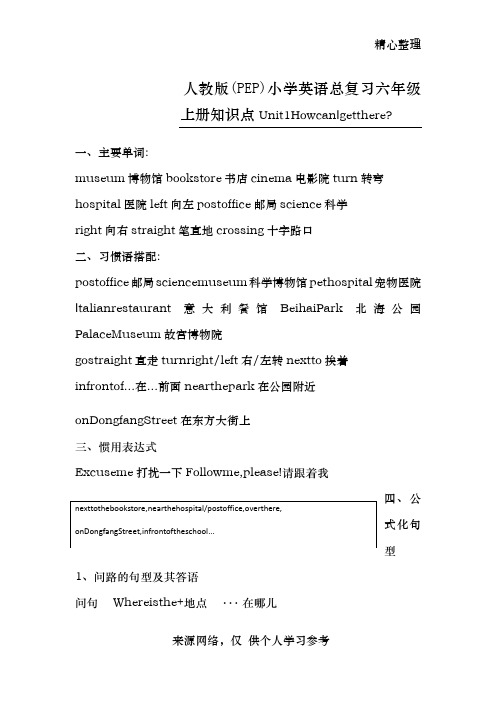
精心整理人教版(PEP)小学英语总复习六年级上册知识点Unit1Howcan I getthere? 一、主要单词:museum 博物馆bookstore 书店cinema 电影院turn 转弯:sciencemuseum talianrestaurantExcuseme 打扰一下 1Whereisthe+nexttothebookstore,nearthehospital/postoffice,overthere,I t’s+表示地点的词语。
它···。
2Howcan+主语+get(to)+the+Canyoutellmethewayto+Whereis+Whichisthewayto+Turn+方向+表示地点的介词短语。
atthecinemaatthecornernearthepostoffice...Whereisthecinema,please?I t’snexttothehospital.它与医院相邻。
Turnleftatthecinema,thengostraight.I t’sontheleft.在电影院向1、Whereisthemuseumshop?博物馆商店在哪里?I t’snearthedoor.他在门附近。
2、Whereisthepostoffice?邮局在哪里?I t’snexttothemuseum.它与博物馆相邻。
3、Whereistherestaurant?餐馆在哪里?I t’snexttothetheparkonDongfangStreet.它与东方街上的公园相邻。
Unit2Waystogotoschoolby乘bus公共汽车onfoot步行plane飞机taxi出租车ship subway地铁train火车slow慢的stop停下always usually通常often经常sometimes有时候never从来不,永不Wait Hooray I see.绿灯行Stopataredlight红灯停Waitatayellowlight1Howdoyoucome(to)+2、如何用must某人+must++.···必须···。
人教版PEP英语六年级英语上册各单元单词短语句型全总结
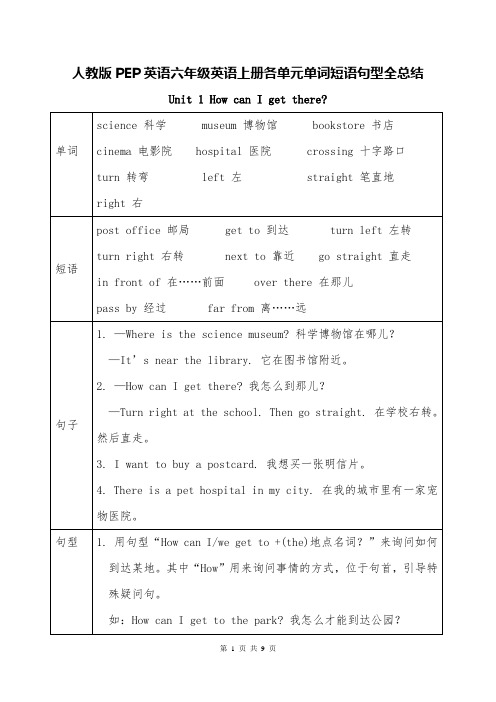
1. 询问爱好的句型
固定句型:What is/are +one’s+ hobby/hobbies?
……有什么爱好?
答语:人+like(s) doing … ……喜欢做……
其中be动词用is还是are,要根据句中hobby的单复数形式而定。如果是单数,be动词用is。如果是复数,be动词用are。另外,句型中的one’s表示的是形容词性物主代词,即:your, her, his, their, its等。意思为“……的”。
单词
by (表示方式)乘 bus 公共汽车 plane 飞机
taxi 出租汽车 ship (大) 船 subway 地铁
train 火车 slow 慢的 down 减少;降低
stop 停下
短语
on foot 步行 slow down 慢下来
pay attention to 注意 traffic lights 交通信号灯
—He works in a car factory. 他在一家汽车工厂工作。
Unit 6 How do you feel?
单词
angry 生气的 afraid 害怕 sad 难过的
worried 担心的;发愁的 happy 高兴的 wear 穿
more 更多的 deep 深的 breath 呼吸 count 数数
3. —Where does he work? 他在哪儿工作?
—He works at sea. 他在海上工作。
4.What does Xiaoyu’s uncle look like?
小于的叔叔长什么样?
句型
1. 用句型“What +do/does+主语+do?”询问他人职业。当主语为第三人称单数形式时,助动词用does; 其他人称用do。如:
小学人教PEP英语六年级上册重点单词、短语、句型汇总
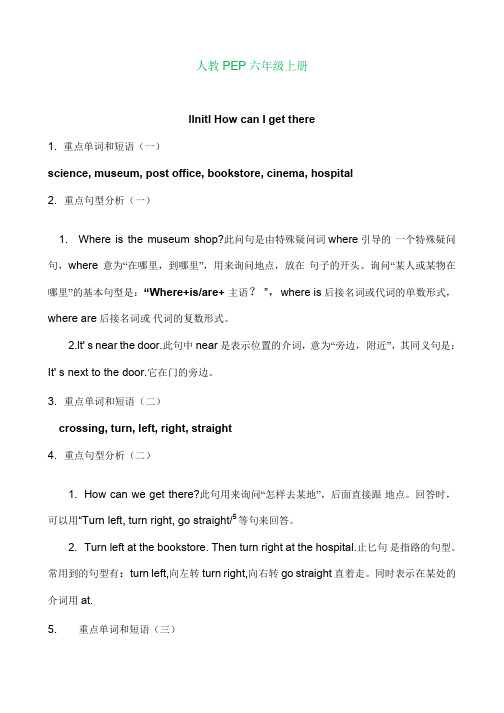
人教PEP六年级上册llnitl How can I get there1. 重点单词和短语(一)science, museum, post office, bookstore, cinema, hospital2. 重点句型分析(一)1. Where is the museum shop?此问句是由特殊疑问词where引导的一个特殊疑问句,where意为“在哪里,到哪里”,用来询问地点,放在句子的开头。
询问“某人或某物在哪里”的基本句型是:“Where+is/are+ 主语?”,where is后接名词或代词的单数形式,where are后接名词或代词的复数形式。
2.lt' s near the door.此句中near是表示位置的介词,意为“旁边,附近”,其同义句是:It' s next to the door.它在门的旁边。
3. 重点单词和短语(二)crossing, turn, left, right, straight4. 重点句型分析(二)1. How can we get there?此句用来询问“怎样去某地”,后面直接跟地点。
回答时,可以用“Turn left, turn right, go straight/5等句来回答。
2. Turn left at the bookstore. Then turn right at the hospital.止匕句是指路的句型。
常用到的句型有:turn left,向左转turn right,向右转go straight直着走。
同时表示在某处的介词用at.5. 重点单词和短语(三)Tasty, buy, London Eye, next to, far from, go straight, turn left, stomach 6. 重点句型分析(三)Is the Thames far from here? No.此句是个be动词开头的一般疑问句,其回答要用yes或no.句中的far from意为“离 ............................................. 远”。
PEP小学英语六年级上下全册知识点总结
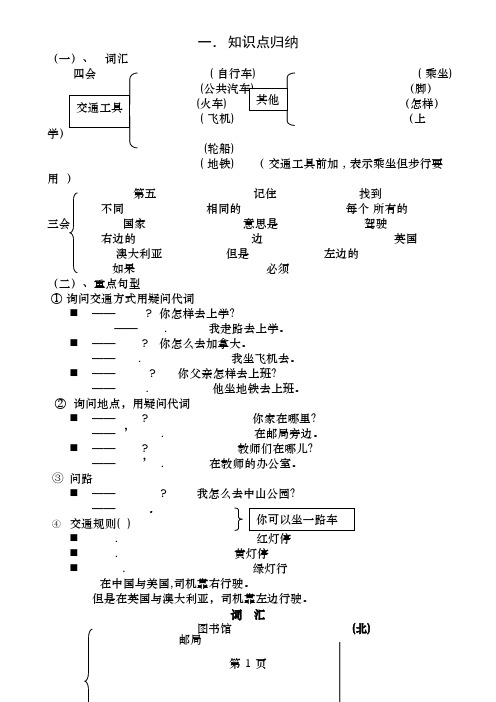
一. 知识点归纳(一)、 词汇乘坐) (脚)火车(怎样) 飞机(上轮船) ( 地铁) ( 交通工具前加 , 表示乘坐但步行要用 )第五 记住 找到不同 相同的 每个 所有的三会 国家 意思是 驾驶右边的 边 英国 澳大利亚 但是 左边的 如果 必须(二)、重点句型① 询问交通方式用疑问代词⏹ —— ? 你怎样去上学?—— . 我走路去上学。
⏹ —— ? 你怎么去加拿大。
—— . 我坐飞机去。
⏹ —— ? 你父亲怎样去上班?—— . 他坐地铁去上班。
② 询问地点,用疑问代词⏹ —— ? 你家在哪里?—— ’ . 在邮局旁边。
⏹ —— ? 教师们在哪儿?—— ’ . 在教师的办公室。
③ 问路⏹ —— ? 我怎么去中山公园?—— .④ 交通规则( )⏹ ⏹ . 黄灯停 ⏹ . 绿灯行在中国与美国,司机靠右行驶。
但是在英国与澳大利亚,司机靠左边行驶。
词 汇图书馆 (北) 邮局医院: 电影院(地点) 书店 (东) (西)科学博物馆银行学校(南)超市鞋店在哪里请与…相邻右边,正确的左边成直线地然后转弯对不起想要双分钟告诉乘坐远放学以后上车下车第十二聚会;晚会开始买句型一、问路. , ? 请问电影院在哪儿?. 在医院的旁边。
. 在学校的前面.在公园的后面’ . 在动物园的附近.. 在书店的左右边.. 在银行的东边.. 离这儿很远.. , 请问这附近有电影院吗?, . 有.. ? 我该怎样到达医院呢?二、指引路. . 你可乘坐路公交车去那儿.. …在…地方上车下车.. . 向前直走在分钟.. …在…地方向右左转.朝东西南北走…分钟.三 ? 离这儿远吗?一.知识点归纳(一)、词汇四会下周报纸今天上午漫画书今天下午杂志(时间 ) 今天晚上字典今夜明信片明天去旅游主题公园买一些水果宠物店(活动)去看电影(其他)水果摊参观长城鞋店阅读有关植物的杂志商店三会:忙碌的一起地需要其他二、重点句式与句型:本单元中出现的一个重点语法项目是一般将来时:表示将要发生的动作或状态,常与表示将来的时间连用。
pep小学英语六年级上册期末总复习--单词+句型+语法练习
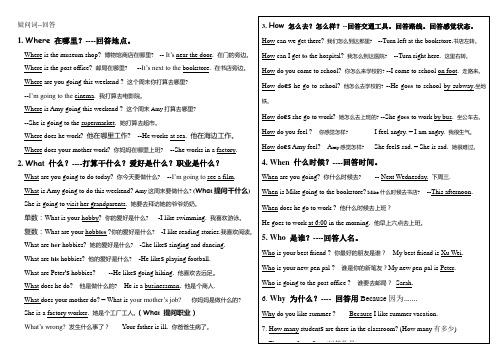
1.Where 在哪里?----回答地点。
Where is the museum shop? 博物馆商店在哪里? -- It’s near the door. 在门的旁边。
Where is the post office? 邮局在哪里? --It’s next to the bookstore. 在书店旁边。
Where are you going this weekend ? 这个周末你打算去哪里?--I’m going to the cinema. 我打算去电影院。
Where is Amy going this weekend ? 这个周末Amy打算去哪里?--She is going to the supermarket. 她打算去超市。
Where does he work? 他在哪里工作? --He works at sea. 他在海边工作。
Where does your mother work? 你妈妈在哪里上班?--She works in a factory.2. Wha t 什么?----打算干什么?爱好是什么?职业是什么?What are you going to do today? 你今天要做什么?--I’m going to see a film. What is Amy going to do this weekend? Amy这周末要做什么? (Wha t提问干什么) She is going to visit her grandparents. 她要去拜访她的爷爷奶奶。
单数:What is your hobby? 你的爱好是什么? -I like swimming. 我喜欢游泳。
复数:What are your hobb ies ?你的爱好是什么? -I like reading stories.我喜欢阅读。
What are her hobbies? 她的爱好是什么? -She like s singing and dancing.What are his hobbies? 他的爱好是什么?-He like s playing football.What are Peter’s hobbies? --He like s going hiking. 他喜欢去远足。
PEP六年级上册单词、句型和语法复习总结

背诵本学期学过的句子:◆Where is the cinema, please? It’s next to the hospital. ----问地点Where is your home? My home is near the post office.Where are you going this afternoon? I am going to the bookstore.Where does the rain come from? It comes from the clouds.Where are you going? I am going to the sky.◆How do you go to school? I go to school by bike. -----问交通方式How do you go to Canada? I go by plane.How can I get to Zhongshan Park? You can go by the No.15 bus. -----问路How can I get to the museum? Go straight for five minutes. Then turn left.How do you do that? ----问种植◆What are you going to do this evening? ----- 问做什么I am going to the cinemaWhat are you going to do on the weekend?I am going to visit my grandparents this weekend.What are you going to do after school?I am going to buy a pair of shoes in the shoestore.What is your hobby? I like collecting stamps. --------问喜好What does your mother do? She is a TV reporter. ------问职业What should do you then? ------- 问种植◆When are you going? I am going at 2 o’clock. -----问时间◆Who are you? I am little water drop. ----问谁◆Which floor? The fifth floor, Room 5A. ----问哪一层PEP六年级上册三会句型1. My home is near.2.What about you?3.Look at the traffic lights.4.Remember the traffic rules.5.Stop at a red light.6.Wait at a yellow light.7.Go at a green light.8.Can I go on foot? Sure, if you like. It’s not far.9.Where is the …? It’s near the …10.Excuse me, is there a … near here? Yes, there is.11.Is it far from here? No, it’s not far.12.–Thank you. –You’re welcome.13.Where is the …?It’s east/west/south/north of the …14.When are you going? I am going at 3 o’clock.15.Can he go with us? Sure.16.Let’s go together.17.There is a stamp show on Sunday.18.She is a teacher. She teaches math.19.Does your pen pal live in Shanghai?No, he doesn’t. He lives in Beijing.20.Where does she work? She works in a car company.21.How does she go to work? She goes to work by bus.22.Where does the … come from? It comes from the …23.How can the water become vapour?The sun shines and the water becomes vapour.24.How do you do that?First, put the seeds in the soil.25.It’s easy.26.What should you do then?Water them. In several days, you can see a sprout.27.First, …Then, …Next, …At last, …语法复习一、现在进行时态(3种变化规律)1. 直接加ing:do—doing draw—drawing cook—cooking answer—answering read—reading listen—listening fly—flying sing—singing play—playing2. 去掉末尾的e加ing:write—writing dance—dancing take—taking have—having make—making ride—riding dive—diving3. 双写末尾字母加ing:get—getting run—running swim—swimming1 / 3sit—sitting put—putting你正在干什么?What are you doing? I’m answering the phone.他/她/它正在干什么?What is he/she/it doing? He’s/She’s/It’s …他(她、它)们正在干什么?What are they doing? They are …看到like或likes后面的动词要加上ing二、一般将来时态(be going to/will + 动词原形)表示一般将来时的时间状语有:this morning, this afternoon, this evening, tomorrow, tonight, this weekend, on the weekend, next week, next month, next year, next weekend.(今晚)你将要做什么?What are you going to do (this evening)?I’m going to the cinema.I’m going to visit my grandparents.你将什么时候去?When are you going?I’m going at 7:10.你将怎样去呢?How are you going?I’m going by bus.今天下午你将要去哪里?Where are you going this afternoon?I’m going to the bookstore.你将要买什么呢?What are you going to buy?I’m going to buy a comic book.你将和谁一起去?Who are you going with?I’m going with my parents.三、第三人称单数后面的动词要加s或es1. 一般情况加s,如:read—reads;live—lives;play—plays;sing—sings2. 动词末尾以s,x,ch,sh或部分以o结尾的加es。
- 1、下载文档前请自行甄别文档内容的完整性,平台不提供额外的编辑、内容补充、找答案等附加服务。
- 2、"仅部分预览"的文档,不可在线预览部分如存在完整性等问题,可反馈申请退款(可完整预览的文档不适用该条件!)。
- 3、如文档侵犯您的权益,请联系客服反馈,我们会尽快为您处理(人工客服工作时间:9:00-18:30)。
PEP六年级上册复习一(词汇)四会单词(听说读写)Unit 1:by (经……,乘……) foot(脚) bike(自行车) bus(公共汽车) train(火车) how(怎样) go to school(上学)traffic(交通) traffic light(交通灯) traffic rule(交通规则)stop(停;停车站)wait (等;等待)get to(到达)by plane(乘飞机) by ship(乘轮船) by subway(乘地铁)Unit 2:library(图书馆) post office(邮局) hospital(医院) cinema(电影院) bookstore(书店)turn(转弯) then(然后) where(在哪里,到哪里) please(请) next to(与……相邻) turn right (向右转) turn left(向左转) go straight(笔直走) north(北) south(南) east(东) west(西)Unit 3:next week(下周) this morning(今天上午) this afternoon(今天下午) this evening (今天晚上) comic book(漫画书) post card(明信片) newspaper(报纸) buy(购买)Unit 4:hobby(爱好) ride a bike—riding a bike(骑自行车) play the violin—playing the violin(拉小提琴) dive —diving(跳水) make kites—making kites(制作风筝) collect stamps—collecting stamps(集邮) live—lives(居住) teach—teaches(教) go—goes(去) watch—watches(看) read—reads(读,看) does(助动词,无义) doesn’t=does notUnit 5:singer(歌唱家,歌手) writer(作家) actor(男演员) actress(女演员) artist(画家)TV reporter(电视台记者) engineer(工程师) accountant(会计) salesperson(销售员)policeman(男警察) cleaner(清洁工) where(在哪里;到哪里) work(工作)Unit 6:rain(雨;下雨) cloud (云;云彩) sun(太阳) stream((小)河;(小)溪) come from(来自……;从……来) seed(种子) soil(土壤) sprout (苗;芽;嫩芽) plant(植物;种植) should (应该) then(然后)三会单词(听说读)a pair of(一双)always(总是;一直)dictionary(词典;字典)magazine(杂志)tomorrow(明天)excuse me (对不起)fun (快乐;乐趣)go to the cinema(去看电影)look(看上去)month(月份;月)read a magazine(阅读杂志)science museum (科学博物馆)shoe store(鞋店)show(展览;演出;表演;节目)take(乘坐)take a trip(去旅行)tell(告诉)tonight(今晚)vapour(蒸汽;水汽)want(想要)with (同……;和……)know(知道)minute (分钟)again(再一次;又;再)PEP六年级上册复习二(句型)四会句型(听说读写)Unit 1How do you go to school, Sarah? Sarah 你怎么去学校?Usually I go to school on foot. 通常我步行去。
Sometimes I go by bike.有时我骑自行车。
How can I get to Zhongshan Park? 我怎么才能到达中山公园?You can go by the No.15 bus.你可以坐15路公车。
Unit 2Where is the cinema, please? It’s next to the hospital. 请问,电影院在哪?它紧挨着医院。
Turn left at the cinema, then go straight. It’s on the left.在电影院那里左转,然后直走。
它就在左边。
Unit 3What are you going to do on the weekend? 这个周末你要做什么?I’m going to visit my grandparents this weekend.这个周末我打算去拜访我祖父母。
Where are you going this afternoon? I’m going to the bookstore.今天下午你去哪?我要去书店。
What are you going to buy? I am going to buy a comic book. .你要去买什么?我要去买一本漫画书。
Unit 4What’s your hobby? I like collecting stamps. 你的爱好是什么?我喜欢集邮。
He likes collecting stamps, too.他也喜欢集邮。
Does she teach English? No, she doesn’t. 她教英语吗?不,她不教。
Does she teach you math? Yes, she does.她教你数学吗?是的,她教。
Unit 5What does your mother do? She is a TV reporter.你的妈妈是做什么的?她是电视台记者。
Where does she work? She works in a school. .她在哪里工作?她在学校工作。
How does she go to work? She goes to work by bus.她怎么去工作的?她乘公交车去上班。
Unit 6Where does the rain come from? It comes from the clouds.雨是从哪里来的?它来自云。
How do you do that? .你是怎么做的?What should you do then?接下来该怎么做?三会句型(听说读)1. My home is near. 我的家就在附近。
2.What about you?你呢?3.Look at the traffic lights.看交通灯。
4.Remember the traffic rules.记住交通规则。
5.Stop at a red light.红灯停。
6.Wait at a yellow light.黄灯等。
7.Go at a green light. 绿灯行。
8.Can I go on foot? 我能步行去吗?Sure, if you like. 当然可以,如果你喜欢的话。
It’s not far.它并不远。
In China(In the US美国),drivers(司机)drive(开车)on the right(右边)side of the road.In England and Australia(在英国和澳大利亚),drivers (司机)drive(开车)on the left side(左边)of the road.9.Where is the …? It’s near the …。
在哪? 它在。
的旁边。
10.Excuse me, is there a … near here? Yes, there is.打扰一下,在这附近有电影院吗?是的,有11.Is it far from here? No, it’s not far.离这儿远吗?不,不远。
12.–Thank you. –You’re welcome.谢谢!不用谢!13.Where is the …?。
在哪?It’s east/west/south/north of the …它在。
的东/西/南/北面。
14.When are you going? I am going at 3 o’clock. 你打算什么时候去?我打算三点钟去。
15.Can he go with us? Sure.他能跟我们一起去吗?当然可以。
Let’s go together.让我们一起走。
I’m going to buy a magazine about关于plants植物我打算买一本关于植物的书I want to be a science teacher one day 将来有一天我想成为一名科学老师16.There is a stamp show on Sunday.星期天有一个邮票展。
17.She is a teacher. She teaches math.她是一名教师,她教数学。
18.Does your pen pal live in Shanghai?你的笔友住在上海吗?No, he doesn’t. He lives in Beijing. 不,他不是,他住在北京。
19.Where does she work? She works in a car company.她在哪里工作?她在一家汽车公司上班。
20.How does she go to work? She goes to work by bus.她怎样去上班?她坐公交车去上班。
21.Where does the … come from? It comes from the …。
来自哪里?它来自。
22.How can the water become vapour?水是怎样变成水蒸气的?The sun shines and the water becomes vapour.太阳照射,水就变成了水蒸气。
23.How do you do that? It’s easy. First, put the seedsin the soil.你是怎么做的?很简单,首先,把种子放进土里。
24.What should you do then?然后该怎么做?Water them. In several days, you can see a sprout.给它们浇浇水,几天后,你能发现一颗嫩芽。
25.First, …Then, …Next, …At last, …首先,然后,接下来,最后26.What are you going to be?将来你想当什么? I’m going to be a writer.我想成为一名作家27.Amy is going to be an artist Amy 想成为一名画家。
